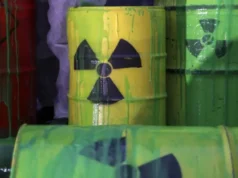Russia hits back with countermoves on Western sanctions

West-fanned tensions around Ukraine drag world economy into quagmire
As the Russia-Ukraine military conflict entered its 14th day , global attention has increasingly focused on the economic repercussions of the West-fanned tensions around Ukraine, with soaring oil prices in the wake of Western sanctions casting a shadow over the global economic rebound amid inflation woes and the still raging pandemic.
While Western sanctions could make Western powers especially European countries inevitably have to bear the brunt of a relentless rise in oil prices, countermeasures from Russia in response to tough sanctions, including its Monday approval of a list of “unfriendly” countries and regions, are considered to have shown the cards in the Kremlin’s hands as Moscow strives to withstand an escalation in sanctions, analysts noted, adding that such measures could also intensify Russia’s isolation.
As both India and China have taken their stance, the eventual resolution of the Ukraine issue cannot be contingent upon unilateral Western sanctions, but would instead require dialogue and negotiations for the conflict to be solved in a peaceful manner.
President Putin has spoken to PM Modi , President Macron and President Xi on the subject . During a virtual summit with French President Emmanuel Macron and German Chancellor Olaf Scholz , Chinese President Xi Jinping said that sanctions would have an impact on global finance, energy, transportation and supply chain stability, and put a drag on the world economy that is already ravaged by the pandemic, auguring ill for all parities. The Chinese leader called for equal-footed dialogue among the EU, Russia, the United States and NATO to resolve the crisis.
price surge
The West’s move to bar imports of Russian oil as part of their sanctions stokes fears of a runaway spike in oil prices, putting at stake an economic rebound in especially the Western powers that have aimed their sanctions ammunition against Russia, observers said.
President Joe Biden announced on Tuesday that the US will ban Russian oil imports, according to CNBC. Just before Biden’s announcement, the UK unveiled its own ban on imports of oil from Russia. Moreover, the EU announced earlier Tuesday a plan to wean itself off from fossil fuels from Russia.
Japan, counting Russia as an important crude oil supplier, is also reportedly in talks with the US and European countries about a possible ban on Russian oil imports, Reuters reported.
In a much-talked-about move, a US delegation made a rare trip to Venezuela over the weekend, discussing the possibility of loosening sanctions against Venezuelan oil exports as Washington weighs ways to reduce its consumption of Russia oil, media reports said.
After peaking at $139.13 a barrel intraday on Monday, the international benchmark, Brent crude has fallen back to hold well above $120. Banning Russia oil, if finalized, would add fuel to the oil price surge.
“It is absolutely obvious that abandoning Russian oil will lead to catastrophic consequences for the world market. A surge in prices will be unpredictable – more than $300 per barrel, if not more,” Russia’s TASS news agency reported on Monday, citing Russian Deputy Prime Minister Alexander Novak.
With both sides of Russia and the West increasing the intensity of sanctions on each other, they are caught in a dangerous trend of pushing a cutoff in the energy trade between the two regions.
Using the Russian ruble to settle trade payments is extremely difficult currently, particularly after the exclusion of selected Russian banks from global payment system SWIFT. As a result, Europe will be compelled to make a distinct choice between ending crude imports from Russia and yielding to Russia’s demands.
Cutting energy trade links with Russia would exert a severe impact on Europe’s economy, as oil and natural gas price will rocket up, adding to already rising inflation and making it more difficult for Europe to recover from the pandemic-triggered economic slowdown.
Russia is the world’s No.3 producer of oil, mostly crude oil, behind the US and Saudi Arabia. It’s also the world’s top exporter of oil to global markets and the No.2 crude oil exporter behind Saudi Arabia, according to the International Energy Agency (IEA).
Roughly 60 percent of Russia’s oil exports go to European members of the Organization for Economic Co-operation and Development (OECD), per IEA data. Russia is betting that Europe can’t stand a complete cutoff from Russia’s energy supplies, but actually it’s hard to say if Europe will do such a thing even at the expense of high economic losses.
An immediate result of the intensifying sanctions is surging crude prices, as he expects that oil prices might break beyond $150 a barrel.
A similar move in the works against Russian natural gas tends to exacerbate the economic fallout on EU countries in particular.
Italy has plans to become independent of gas imports from Russia within 24-30 months, according to Reuters, citing remarks by Italian Energy Transition Minister Roberto Cingolani on Tuesday.
In case of a cutoff of Russian natural gas supplies, Slovakia, Austria and Italy are likely to be among the worst-hit places .
German would be the most fragile among major European nations if the worse-case scenario unfolds, according to the observer, speaking of the losses to bear on the part of the EU.
Last year, the EU’s imports of natural gas from Russia accounted for around 45 percent of its total gas imports and close to 40 percent of its entire gas consumption, according to IEA numbers.
Runaway crude oil prices also feed panic through global equity markets, as the resultant higher inflation amplifies concerns over a more aggressive cycle of US Federal Reserve rate hikes.
With the global economic recovery at risk of an energy price spike-inflicted downturn, China might feel greater imported inflationary pressure, experts said.
Local governments should step in with supportive policies, like subsidies, if the prices of energy fluctuate too strongly, especially for natural gas which is used by residents for heating, they suggested.
Last year, China’s reliance on overseas crude oil fell 1.88 percentage points to 71.95 percent, while its reliance on overseas natural gas rose by 2.39 percentage points to 44.3 percent, according to data from China Galaxy Securities.
Over the long term, China should move to reduce reliance on overseas energy imports, he remarked, noting that one thing that China should do is to develop alternative energy by increasing the layout of wind power, electric cars and photovoltaic capacities.
Cards in Kremlin’s hands
It is also noteworthy that Russia has hit back at Western sanctions with countermeasures that are seen to have shown the cards in the Kremlin’s hands, albeit possibly distancing Moscow further from the global system.
In one such move, “Russian citizens and companies, the state itself, its regions and municipalities that have foreign exchange obligations to foreign creditors from the list of unfriendly countries will be able to pay them in rubles,” according to TASS news agency.
“The new temporary procedure applies to payments exceeding 10 million rubles per month (or a similar amount in foreign currency),” the report said, citing the newly unveiled decree.
The latest action is a countermeasure from Russia in response to the West’s financial sanctions. Before Western sanctions kicked in, the ruble could be freely converted to the US dollar or the euro, enabling Russia’s domestic debtors to repay their overseas obligations. But freezing Russia’s stockpile of foreign exchange reserves and excluding Russian banks from SWIFT means the ruble cannot be readily used for foreign exchange conversion and overseas payments.
Russia could have opted for the yuan or the Singapore dollar in its foreign exchange assets for overseas payments before being converted into the dollar to pay its creditors, Wu continued, noting that the decision to use the ruble is tantamount to a countermove against the West.
With the ruble subject to wild swings, Russia’s overseas creditors would be exposed to huge financial risks if they receive repayments in the ruble that could turn out to be a stack of “waste paper” in case of significant ruble depreciation or the Russian currency becoming non-convertible, the analyst commented.
In another countermeasure, the Russian government has also reportedly revised its rules concerning compensation paid to patent rights holders, with the new regulation stipulating that patent holders from unfriendly countries and regions would be entitled to zero percent of the actual proceeds from the manufacture and sale of goods and the offering of services, if their inventions or industrial design are used without authorization.
While the potential impact of the new regulation on Western technology giants that have moved to stop sales and curb services in the Russia market remains unfathomable, the economic shockwaves per se could be limited, factoring in Russia’s entire expenditure on information and communication technologies that hit roughly $50 billion in 2021, according to market research firm IDC.
What matters more, as experts pointed out, is that the regulation actually facilitates Russian firms to use foreign patents for free, a countermeasure against the West’s technology embargo on Russia.
What’s more, the Russian authorities are purportedly working on the possibility of waiving criminal and administrative liability for the use of pirated software, according to media reports.
Russia’s response seems more likely a countermove against Western high-tech firms, according to Zhang Hong, an associate research fellow at the Institute of Russian, Eastern European & Central Asian Studies of the Chinese Academy of Social Sciences.
Tech giants including Google, Apple and Microsoft are among the firms announcing a revamp of their business plans in Russia amid the Russia-Ukraine tensions.
In yet another move that speaks to Kremlin’s ammunition of countermeasures, Russia has imposed a temporary ban on medical products delivered from countries and regions that have joined the sanctions, Interfax reported on Tuesday.



